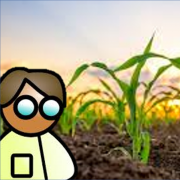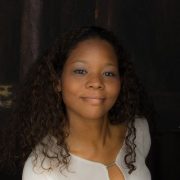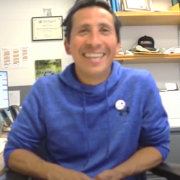Informational Interview with Prof. Robert Jinkerson, UC Riverside
Informational Interview by Ruth (Jean Ae) Kim, ASPB Conviron Scholar 2020
Dr. Robert Jinkerson is an Assistant Professor at the University of California, Riverside in the Department of Chemical and Environmental Engineering and Department of Botany and Plant Sciences. He is one of the most interdisciplinary researchers on paper you have seen. He obtained his undergraduate degree in Biological Engineering at the University of Missouri, his Ph.D. in Applied Chemistry at the Colorado School of Mines, and his Post-doctorate in Plant Biology at the Carnegie Institution for Science.
His work focuses on combining engineering and plant biology to make discoveries in the basic sciences that can be translated to impactful applied technologies. Broadly focusing on algae and plants, his work strives to be on the cutting edge while answering questions about the fundamental biology of these organisms.
In this interview, we discussed many topics covering his career path and advice, and his unique perspective and vision for his research and the future of plant biology.
The following is a transcript of the interview I had with him:
Career path
Can you introduce your background?
Originally I am from St. Louis, Missouri. I went to the University of Missouri and did my undergraduate degree in Biological Engineering. I actually was not really that interested in plants as an undergraduate. I did undergraduate research on tissue engineering using a 3D printer. This was before the big 3D printing wave and so the technology was really new and cutting-edge.
The summer of my Junior year, I went to the NIH for a research program and worked at the Clinical Center in the Diagnostic Radiology Department. I had a great experience, but I began to recognize that so many people were focused on medicine and medical technologies. I realized that if you don’t have energy to power the hospital or gasoline to drive the doctor there, then it doesn’t really matter what kind of medical technology you have. Energy and food are so fundamental to society, but it just didn’t seem like a lot of people were pursuing these directions, so I decided to go away from the field of medicine and toward energy.
How did you enter the field of plant biology?
I wanted to focus on energy and stay in biology which led me to biofuels. I was drawn to algae because it was at an early stage in its technology curve. I felt that I could make a bigger impact because the earlier you are in a new technology the further your efforts go to improving that technology. The more developed a technology is the more incremental your advances usually are. All of this potential upsides is one reason I wanted to get into algae research.
During my senior year of undergraduate, I got invited to do the Council of Undergraduate Research Posters on the Hill, where I went to Washington D.C. and presented to Senators and Congressmen about research and promote undergraduate research. They co-held the event with the American Chemical Society and I talked with a professor from the Colorado School of Mines about my interest in biofuels and he encouraged me to apply for their program. The following year, I reached out to him and he said there was a new professor at CSM in algae biofuels, Matthew Posewitz. I met with him, he encouraged me to apply, so applied and got in, even though it was already May. I was very fortunate because they still had one spot open for that graduate class. So I ended up in the Colorado School of Mines working with Matt Posewitz as my Ph.D. advisor.
Because algae are plants, that’s how I got into plant research. I was looking at these organisms as a tool to produce fuels.
How was your PhD to postdoc transition?
I did my postdoc at the Carnegie Institution for Science, my advisor was Martin Jonikas. I had known about him before at a conference where I gave a talk and I knew he was working in Chlamydomonas which is a green algae. I happened to be in St. Louis when the International Photosynthesis Conference was taking place. I ended up crashing the conference and meeting Martin. For some reason I had a poster at my home so I brought it and hung it up in an empty spot so I could show him. He had a postdoc leaving but wanted someone to continue the project, so I interviewed in California a week later and got the position. I had not finished my thesis yet and he helped me apply for postdoc fellowships. About six months later I finished my PhD, defended, and drove out to California to start.
I was lucky to get a fellowship from the Simons Foundation through the Life Science Research Foundation that paid for three years of my post doc. Since I had funding I had more flexibility in my research. Some of the projects I worked on at the time I am continuing to work on now because they were my own ideas. So if you can get a little bit of flexibility and you’re planning to go into academia, it is good to have projects you can bring with you that are yours so it’s not like you are starting from zero. You can start on them right away in your faculty position and you may already have preliminary data which can be really helpful for applying for grants.
How was the process of obtaining your current position?
I decided I would try to get an academic position but I knew how competitive it was to obtain one. The second year of my postdoc, I went to the American Institute of Chemical Engineering conference because they have a poster session called Meet the Faculty Candidate Poster Session where faculty candidates present posters on themselves and their proposed research and faculty members of departments who are hiring meet the candidates.
I went to practice for the next year when I was planning on applying for positions. A faculty member from UC Riverside encouraged me to apply that year because they had an opening for translational plant biology where they wanted to merge engineering and plant biology. I thought it was a very good fit. UCR has a strong plant biology department and they are very open minded about connecting engineering, plant biology, and translational plant biology. So I applied and ended up getting the position. Because I wasn’t planning on applying that year, I only applied to UCR and got an offer which makes my story a bit atypical. I’ve been very happy since coming here.
What are the key things that helped you obtain your position?
I think the thing that helped me the most in obtaining my position was being a good fit for the type of research they were looking for. At UC Riverside, they were searching for a translational plant biology candidate, someone that was half engineering and half plant biology. Because I did my undergraduate in engineering, my PhD on algae, and then my post-doc in a Department of Plant Biology, I was a perfect fit of what they were looking for. There are probably not many people who have that background, so that likely helped me by narrowing the pool of qualified applicants. If you find a position where you fit what they are looking for, then your chances of obtaining it are much better. Also the timing has to be right so a little bit of luck is needed to make everything align.
During my interview I made a strong effort to present my research in an interesting and exciting way. After my research presentation I got a lot of questions from the audience and feedback from some senior faculty members that they learned some new things about algae during my presentation, so having an engaging presentation is key.
Motivation and Skills for the Job
Did you always want to go into academia?
I was always interested in having a research based career either at a start-up, in academia, or at a research institute. I never had a desire to be in a big company because I felt like I would have a limited impact. I feel like at a start-up or in academia you more directly benefit from the hard work you put in. To me, the most important thing is about making new discoveries and making an impact. I thought that I would have more of an impact in those positions.
I know that a lot of people are really focused on being a professor, but I was more open about my opportunities. My goal was not necessarily to be a professor but to pursue a research focused career. So I think that again I have a different perspective than some people. I like being a professor. But if I didn’t get a faculty position I would have found another research focused career in a research institution, start up, or national lab. Fortunately, this (becoming a professor) ended up being one of the avenues that was available to me.
What skills does your job require?
There are a lot of skills you need for an academic career. You have to build your research program from nothing. You are the one who really has to make it happen. To get the research going in your lab you will use your scientific training and bench skills learned in graduate school and during your postdoc. But you will also face a lot of things that you haven’t necessarily been trained for. You have to transition into being a manager instead of a “doer” for research. You will find yourself doing things like reading resumes, hiring people, training new students, writing and reviewing grants, managing budgets, teaching classes, etc. I had experience writing proposals and training undergraduates but the level as a faculty is much more advanced.
Writing is something you need and will get better at. The more you write the better you get. In high school I didn’t like writing but with science writing it’s different than creative writing. The goal is to make things as clear and concise as possible. With science writing the more you do the better I think you can get. An academic position forces you to get better because you have to write a lot grants, letters of recommendations, papers, reviews, etc.
Another key skill is to have good time management. I was lucky because my postdoc mentor, Martin Jonikas, had a lot of systems for effectively managing time and accomplishing tasks like writing papers, grants, interviewing, etc that I have adopted to be more efficient. Scheduling out your time to off load tasks from your mind into your calendar and scheduling blocks of time where you have tasks you want to accomplish are key.
Positive things about your job?
One of the things that appeals to me about academia is that I have more control over my research. If I’m at a startup, I would potentially have more commercial impact but it’ll be focused on things that could be profitable and that would limit certain research projects I could do. The benefit of being in academia is that you have more freedom to pursue topics that are of your own choosing. However, you still need to find funding agencies that will support your research.
Another great thing about academia is being able to interact with students. It feels awesome to teach students and have an impact on their lives. Also I love being able to give students the opportunity to get in the lab and get experience conducting research.
What are some of the biggest challenges in your job?
I think getting funding. The funding rates for many federal agencies can be pretty low, like 5 or 10%. There are a lot of special funding opportunities for early career faculty though that I am trying to take advantage of. I think again it’s about finding the right fit and the right agency or program manager willing to support you. Also I am looking for support from a few companies to sponsor some of my research projects.
Philosophy and Vision for the Future
What is your philosophy for what you want to be as a scientist/mentor?
My philosophy for science is to do exciting, cool science that is cutting edge, and to make big discoveries. I think there are big discoveries out there that are low hanging fruit in fields that now people can access with new technologies. I always tell my students, we want to become the leaders of new ideas and open new fields. We don’t want to be chasing something that people already know about. A famous scientist once explained it to me like this- if you’re trying to climb a mountain and you can see the peak, that mountain isn’t high enough. You need to go for the mountain that is so high the peak is in the clouds and you don’t know where the peak is. Those are the mountains you should be climbing. Because if you can see that peak, everyone else can see it too and everyone else is going for it too. And if you make it to the top, once there it’ll be a great achievement. But the other mountain that’s up in the clouds, that is where the big discoveries are. No one knows what is up there. No one knows where that peak even ends. That’s the kind of science that I like to do.
As a mentor, I want my students at some level to feel like my peers. Everyone might be at a different level of education, we have high school students, undergraduates, graduate students in the lab, but I believe everyone can have good ideas and can think about the science. I want to have an open discussion and exchange of ideas and research.
With your unique perspective, where do you think the field of plant biology will go?
My vision may be a little different for the future of plant biology than many others. If you think about the way we approach agriculture it is kind of a unique thing in our society. What else is so essential for our existence as a species but we leave so much up to nature? To feed the planet we are relying on having favorable weather conditions, enough water, no pests, all things we have limited or no control over. As an engineer this is immensely frustrating not being able to control these processes. Here is an example for contrast. If I were a chemical engineer who wanted to produce penicillin how would I do it? Penicillin is made from a fungus, so we would grow the fungus in a fermenter and control everything: the pH, temperature, nutrients, mixing. Out of this fermenter we would get the product, purify it, quantify exactly how much was made, and know exactly how much we could make reproducibly over and over.
If I were to make penicillin like a farmer in our current agricultural system, I would find a wood chip pile somewhere outside, inoculate it with penicillin producing fungus and hope that the weather was okay and hope that other fungus don’t contaminate it. This is crazy. We would never produce medicines this way, so why do we produce food this way?
There are some problems with our traditional agriculture system in terms of climate change and disease. The weather is not precise, there are some good years, but also bad years which will always be a problem and unpredictable. Pests love eating plants too and in this case you’re fighting evolution which is really tough. You cure a specific plant pest but there will always be another one waiting in the wings, and another, and another, forever ready eat your crop. These are kind of inherent problems of plants that I see facing our agriculture system.
From an engineering perspective however, you could almost say that if all I care about is the fruit or vegetable, the food, then maybe we could reimagine the need for the plant. I don’t think plant biologists necessarily think about it this way because often they are really focused on the plant. I’m interested in plants too, but in this case I see the plant as a tool to produce food that we need.
If we start to think about plants in a different way there might be other solutions. A good thought experiment is space. In outer space we won’t have physical space and land to grow food. And yet if we’re moving off the planet to Mars or the Moon, how can we grow food? You can make bacteria or yeast or algae and dry it into a powder. But the question is do you want to eat algae powder for two years when you go to Mars? Probably not.
My hypothesis is that people will still want to eat fruits and vegetables. In the future, you could imagine a different method to produce this food. Let’s say I want to make an apple. Instead of having an apple tree, you could have an apple stem cell, put it in a fermenter, and add all the stimuli to differentiate it into an apple.
Using this method of production, you could imaging producing apples on another planet without needing trees, but you could also imagine using it on Earth. An approach like this could allow us to turn much of our agriculture lands back to natural lands while still producing the foods we desire anywhere on the planet. This is the long term goal but it’s hard to imagine how to get there.
How do we take steps to go towards that goal or achieve some of it?
So I have ideas for two different approaches.
There’s a top-down approach and bottom-up approach.
Let’s start with bottom-up, it’s most like a tissue engineering approach. You grow plant cells in a fermentor and then form them into a food item. The top-down approach is sort of reductionist. If you have a whole tree or plant and you just want the fruit, why not try to minimize the rest of the plant and just make a lot of the fruit.
Both of these have one problem, it’s the energy. Plants do photosynthesis and carbon fixation and that’s where the energy and carbon comes from. Both top down and bottom up systems would be heterotrophic and require energy and fixed carbon inputs so you would need to feed sugar and nutrients to make your food products grow- but these comes from other plants and photosynthesis, so that doesn’t really make sense.
If we could get energy independent of photosynthesis into the system that could be a solution. That might not be such a bad idea because it turns out photosynthesis is super inefficient. Photosynthesis has a 1-2% photon conversion efficiency. You can buy solar panels right now that are 20% efficient, but you can’t eat electrons from your solar panel. So the question is, how do you go from electrons to a fruit or vegetable?
This is where being interdisciplinary has really helped me. I have become familiar with a variety of fields, including electrochemistry, which may provide a solution. I am collaborating with an electrochemist who is doing electrocatalysis, taking electrons and a catalyst to reduce CO2 into fixed carbon. You can then feed this fixed carbon to algae and plants. So we are working on making a different type of cycle, one that uses chemical catalysis to replaces photosynthesis and carbon fixation and coupling that to the production of fruits and vegetables. We are currently trying to figure out if this type of system would work and how efficient it can be. It may or maynot be the the best way forward, but in general I believe that if we can reimagine using the biology of plants in new or unique ways, there might be solutions to many of our problems just waiting to be discovered.
Advice for aspiring scientists?
I’d say pick a research topic that you love and are passionate about. If you do then you can work the long hours, handle the frustrations when things don’t work, and then when it works out, the wins are so sweet right? They’re so exciting! Find the thing you care about so much that you wouldn’t do anything else instead. Something you would do even if you weren’t getting paid. That’s what you should be doing no matter what it is. It’s kind of cliche but I really think that it’s true.
Also I would recommend getting exposure to different scientific fields, disciplines, and ways of thinking. With these unique perspectives try to creatively combine topics or disciplines in new ways. Think outside the box and have an open mind because you never know where your research will take you!








Leave a Reply
Want to join the discussion?Feel free to contribute!